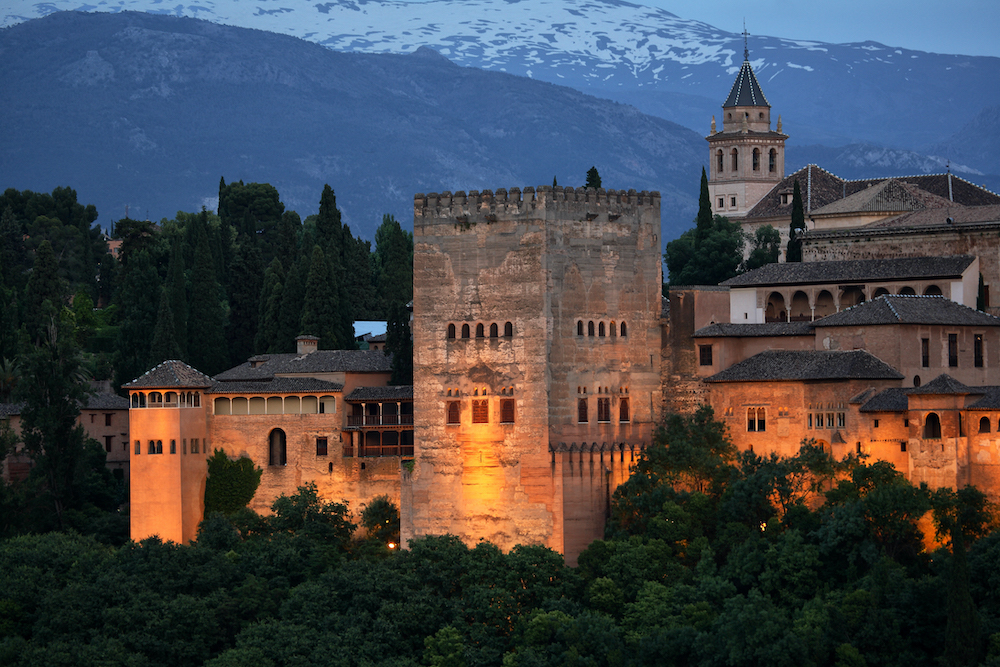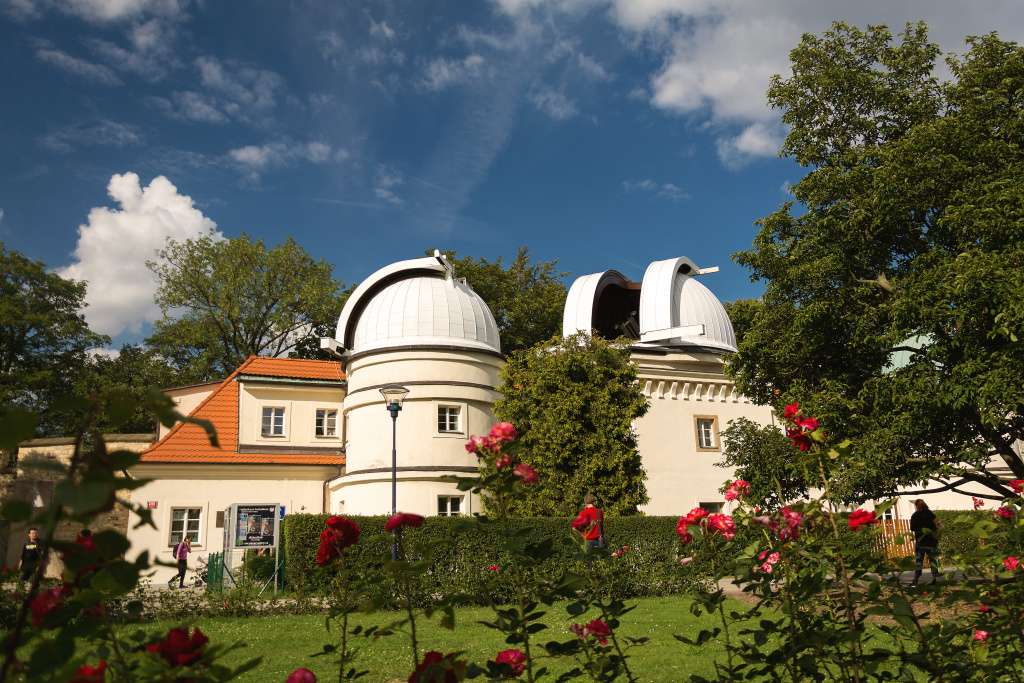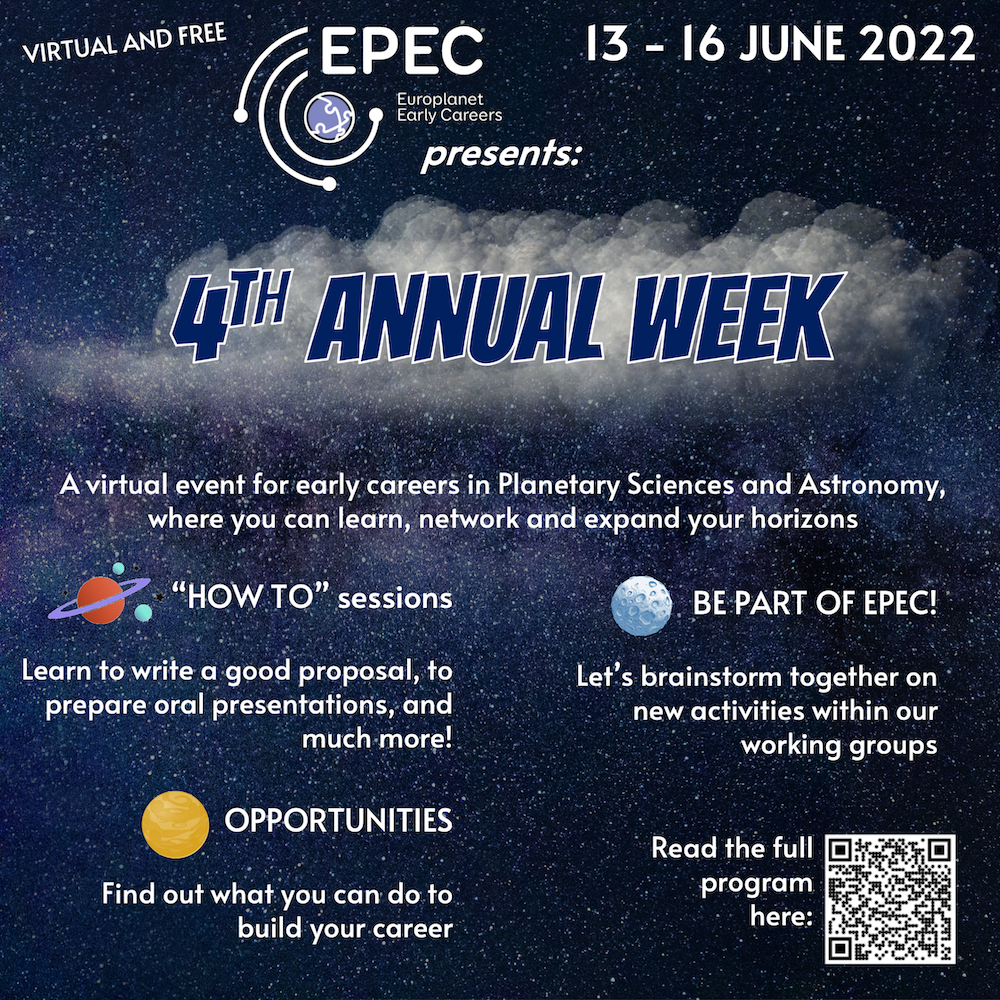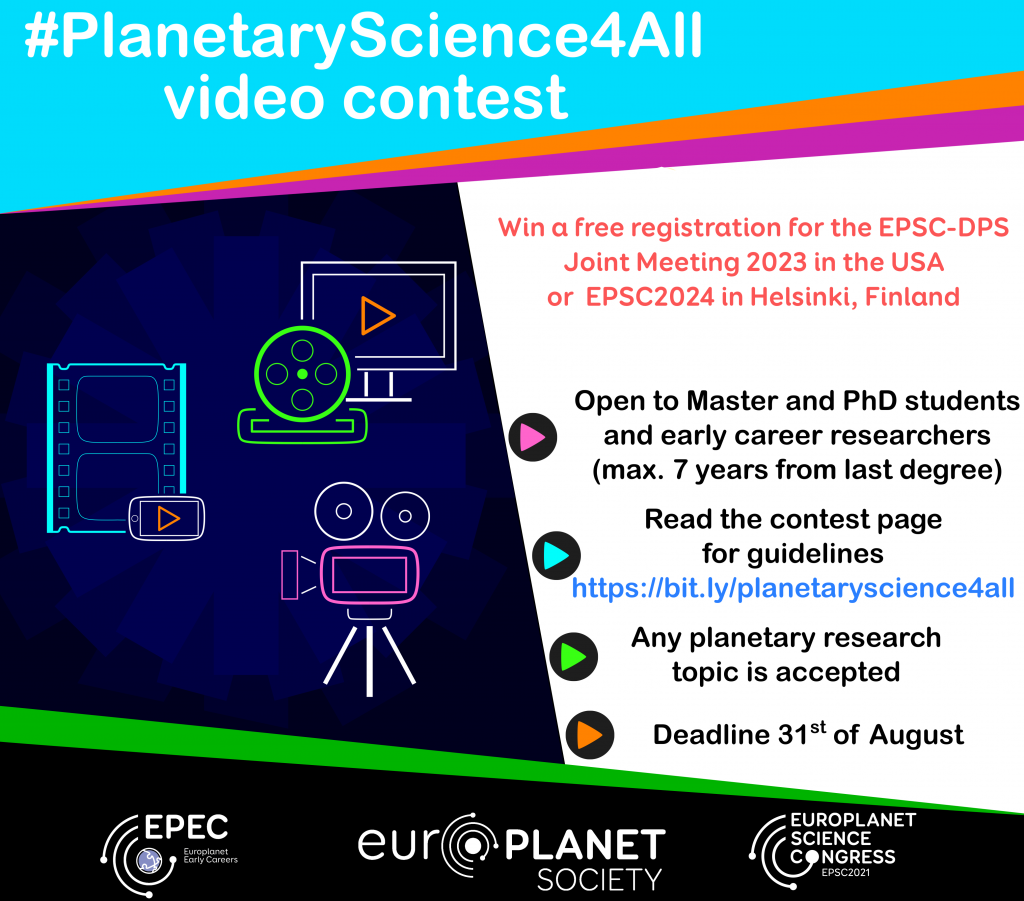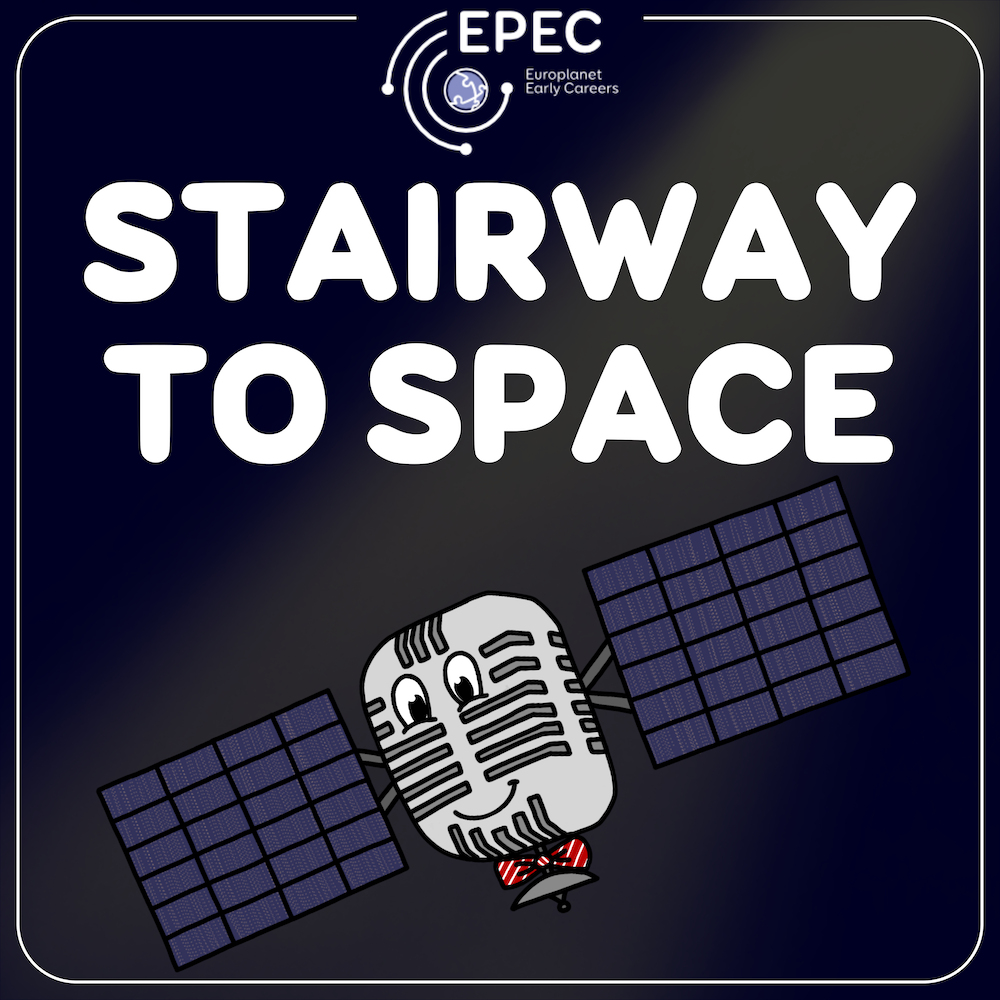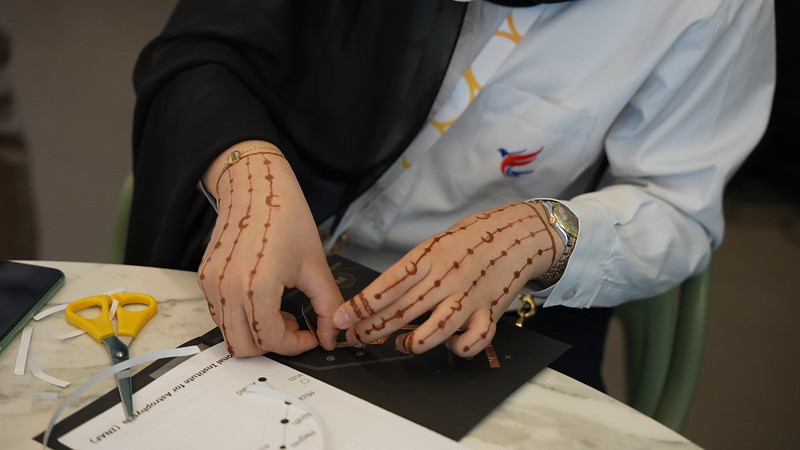

As travel restrictions lift in Spring 2022, there are numerous opportunities for the planetary community to meet virtually and face-to-face.
Europlanet News | EPEC News | Community News
Meet Us in Granada at EPSC2022!
Read article in the fully formatted PDF of the Europlanet Magazine.
Registration is now open for the Europlanet Science Congress (EPSC) 2022 at the Palacio de Congresos de Granada from 18-23 September. The Congress will be held in-person for the first time since the joint meeting with the American Astronomical Society’s Division of Planetary Sciences in Geneva in 2019. EPSC2022 has received nearly 1200 abstracts for over 60 sessions. In response to feedback over the past two years, some innovations from the virtual meeting will be retained, including morning briefings, keynote talks and a Slack online discussion forum. This year’s meeting will be held jointly with the European Astrobiology Network Association (EANA) Conference 2022, so will have a strong focus on astrobiology. Register for earlybird rates by 31 July.

Monthly Webinar Series for Society Members
Read article in the fully formatted PDF of the Europlanet Magazine.
The Europlanet Society is holding an ongoing series of webinars for its members on the last Tuesday of each month. The hour-long sessions aim to support our community by providing opportunities to contribute to policy consultations, learn about sources of funding, share experiences, develop skills, and find out what’s going on in planetary science. Recordings of sessions and slides are available on the Members’ Area of the website. Topics discussed include up-coming calls in Horizon Europe, ESA strategy, pro-am collaborations, mentoring, outreach and much more. Each session includes time for discussion, and post-event feedback and follow-ups are encouraged. If you are yet to join the Europlanet Society, or want to find out more about the webinars, visit the Europlanet website.

Europlanet Pro-Am Comet Community Workshop
Read article in the fully formatted PDF of the Europlanet Magazine.
As part of Europlanet’s activities to foster collaborations between professional and amateur astronomers, a hybrid workshop will be held on 10-12 June 2022 for the pro-am community studying comets. Participants from Europe and around the world will find out about recent progress in comet observation and analysis, share methodologies, consider ways that data can be properly archived, accessed and standardised, and explore opportunities for education, outreach and community building. The physical event is being hosted by Planetum Prague and the Czech cometary science community (SMPH), with support from the Europlanet 2024 Research Infrastructure (RI) and the British Astronomical Association. All sessions and materials will be available online and reported at EPSC2022.

Fast Track Transnational Access
Read article in the fully formatted PDF of the Europlanet Magazine.
The results have been announced of a “Fast Track” programme to mitigate the impact of the pandemic on Europlanet 2024 RI’s Transnational Access (TA) research visits.
The TA programme offers free access to over 40 planetary analogue field sites and facilities for simulation and analysis. Travel restrictions over the past two years have meant that many of the facilities have accumulated a large backlog of TA visits, and the next full call for applications has been delayed to the autumn of 2022.
The Fast Track TA programme has provided interim support for “emergency applications” to allow high impact science, career-impact projects (related to PhD or postdocs contracts) or time-restricted field work to take place over the summer of 2022. Out of 30 applications, 27 were ruled eligible, 20 have been awarded funding, and the first visits have now taken place, including two to the new planetary analogue field sites in Argentina. We look forward to seeing the results!


Fire in the Sky
Read article in the fully formatted PDF of the Europlanet Magazine.
Fireballs are the more spectacular “big siblings” of shooting stars and are monitored, not only for their beautiful visual displays, but also as part of the campaign to watch out for objects that might hit the Earth and cause damage.
During the first weekend of February 2022, the Europlanet 2024 RI project organised the second in a series of workshops bringing different networks of fireball observers and machine learning experts together. Due to the ongoing pandemic the workshop was held virtually, and this online format enabled interested observers from as far away as Brazil, Australia and New Zealand to take part. Workshop participants introduced various fireball observation networks around the globe and discussed progress since the last event in June 2021. An important outcome of the first workshop has been the introduction of a common format for observation data, which has been derived from a template developed by the University of Aberystwyth (UK) during a previous EU-funded Europlanet project.

This allows for a much faster exchange of data, the benefits of which were demonstrated by the recent recovery of the Winchcombe meteorite. The combination of observations of the fireball from different networks enabled the rapid discovery of pristine fragments of the meteorite on the ground. Other presentations during the workshop included an interesting report by the Australian Desert Fireball Network on how drones and machine learning algorithms can also be used to locate meteorites on the ground, enabling a much larger area to be covered, particularly in challenging terrains such as the Australian outback.
The third workshop in the series will be held in conjunction with the 85th Annual Meeting of The Meteoritical Society in Glasgow from 14–19 August 2022.
Meeting report by Ute Amerstorfer and Günter Kargl (IWF-Graz).

Planetary Mapping Winter School
Read article in the fully formatted PDF of the Europlanet Magazine.
The Planetary Mapping Winter School aims to introduce scientists and amateur enthusiasts to geological mapping of other planetary bodies. Following a successful inaugural event in 2021, a second virtual edition of the Winter School was organised from 7-11 February 2022 by the Europlanet 2024 RI project’s GMAP team.
As well as providing general training for a new, inclusive generation of planetary mappers, the second Winter School focused on learning about mapping techniques and open source software. The school attracted more than 200 participants from all around the world. More than half the attendees took part in live sessions, with the rest accessing teaching resources and recorded lessons asynchronously. The first day of the school kicked off with an introduction to mapping and remote sensing principles, with the following days focused on mapping the Moon, Mercury and Mars. Each planetary body has distinctive features that need to be taken into account for geological mapping, such as crater chronology, tectonic deformations, surface composition and stratigraphic relationships. During hands-on exercises, supported by more than 20 dedicated instructors, the trainees mapped large areas of planetary surfaces subdivided into “tiles”, with the goal of producing comprehensive mapping products. Seminars by experts from different universities, geological surveys and research centres complemented the practical mapping tour of the inner Solar System.
Meeting report by Riccardo Pozzobon, Matteo Massironi and Luca Penasa (University of Padua).

Get Involved in EXPLORE
Read article in the fully formatted PDF of the Europlanet Magazine.
The EXPLORE project gathers experts from different science domains and technological fields to develop new tools that will enable and promote the exploitation of space-science data. With many shared partners and areas of interest, EXPLORE is a close collaborator of Europlanet 2024 RI. The project has now released prototype versions of six EXPLORE Scientific Data Applications (SDA) on the EXPLORE platform, and invites the community to participate in beta-testing. The SDAs include two lunar-related applications: L-Explo, which supports the identification of subtle differences within lunar orbital data to enhance geological mapping of the Moon, and L-Hex, which supports human and robotic exploration of the Moon by providing access to historic and recent lunar data. The SDAs will be presented at EPSC2022.
Also launching soon will be the first EXPLORE Data Challenges, which celebrate the 50th anniversary of the Apollo 17 mission – the last time humans set foot on the Moon. Planetary scientists and the machine learning community are challenged to label features and plot a traverse on the surface of the Moon. A Junior Data Challenge has also been designed for schools.

Europlanet Telescope Network Science Workshop
Read article in the fully formatted PDF of the Europlanet Magazine.
The first Europlanet Telescope Network Science Workshop was held virtually on 6-11 February 2022. The goal of this workshop was to encourage submissions of community-led proposals and to highlight scientific results achieved to date with Europlanet Telescope Network facilities and with other medium size and small telescopes.
The Europlanet Telescope Network, which was launched in June 2020, is composed of 16 telescope facilities around the world (diameters around 0.5-2 metres) to support observational campaigns related to planetary science.1 For this workshop, interested astronomers, planetary scientists and amateurs were invited to participate, to learn more about the instruments offered, their capabilities and scientific potential. Sessions were distributed over three half days and were dedicated to Solar System planets, exoplanets, and minor Solar System bodies. The meeting attracted participants from 43 countries (including 11 EU under-represented and 23 non-EU states). Among the 210 participants, were 63 early career researchers, 80 amateurs, 22 educators, and 43 senior researchers, with an overall 30% of the participants being female.
During the first year of the Europlanet Telescope Network’s activities, nine applications have been granted observing time. Four projects have been dedicated to investigations of exoplanet transits and planet-hosting stars; four more targeted asteroid spins, shapes, or thermal parameter determinations. A further successful application was dedicated to protostar formation. The workshop participants have demonstrated that relatively small telescopes can produce first-rate results in planetary science and that both professional and amateur astronomers can make valuable contributions. All the presentations have been recorded and are accessible via the workshop webpage and the YouTube channel of the Moletai Astronomical Observatory.


Europlanet Early Careers (EPEC) News
EPEC reports by Erica Luzzi, Melissa Mirino and Foivos Karakostas.
New Look for EPEC
EPEC has a new logo!
The design is part of a review and update of Europlanet branding. Read more.
- Subscribe to our mailing list
- Become an active member of one or more Working Groups
- Join our Slack channel: epec-network.slack.com
- Follow us on our social media pages
- Join the EPEC Annual Week
- Check the volunteer vacancies on our website
EPEC Annual Week 2022
Read article in the fully formatted PDF of the Europlanet Magazine.
The 4th Europlanet Early Career (EPEC) Annual Week will be held virtually from 13-16 June 2022. Early careers working in planetary sciences, astronomy or in space-related fields, from all around the world, will participate.
This year, in addition to the usual “How to…” sessions, where early careers can learn practical skills for working in academia, we will also discuss topics including the impostor syndrome, science communication, how to look for funding and fellowships, and much more.
Networking is a core value of the Annual Week, so the programme includes time to get to know each other, discuss our research and non-research issues, as well as opportunities to have fun and learn from one another in a friendly environment.

Read article in the fully formatted PDF of the Europlanet Magazine.
#PlanetaryScience4All EPEC-EPSC Video Contest 2022
Submit your entries now for the third #PlanetaryScience4all video contest, organised in collaboration with the Europlanet Early Career (EPEC) network and the Europlanet Science Congress (EPSC) 2022. PhD candidates and students involved in any topic related to planetary science can send a 4-minute video to present their research project. Any type of creative video format is welcome, from Lego movies and animations to more formal presentations. The content should be aimed at a general audience. All videos submitted will be shared via Europlanet and EPEC social media channels, giving visibility for entrants within Europlanet’s worldwide network of planetary researchers, and supporting outreach and science communication. Winners will receive free registration and a travel grant for the DPS-EPSC Joint Meeting 2023 in San Antonio, Texas, or EPSC2024 in Helsinki.

Stay Tuned for a Stairway to Space
Read article in the fully formatted PDF of the Europlanet Magazine.
As planetary scientists, we are lucky to have the chance to be involved in one of the most inspiring human endeavours – the exploration of outer space. From the celestial bodies that were seen by our ancestors as distant companions, to today’s planetary research, this field has an eternal fascination. Beyond science, we are also fortunate to be part of a community of people who share the same passion to study, build knowledge and develop the techniques needed to make this endeavour a reality. To do this successfully, we need to communicate with each other, as well as with a broader community of people who are interested in both how science works and how scientists work.
The Europlanet Early Career (EPEC) network, as an active branch of the Europlanet Society, aims to unite and support students, PhD candidates and postdocs working in our field across the European continent and beyond. EPEC offers the opportunity to share our experiences as we find our way in the academic and industrial sectors of planetary science, and to discuss how we can cooperate, evolve personally and achieve collective goals. EPEC is now preparing to launch “Stairway to Space”, a podcast that aims to amplify our voice around the planet to reach other early careers with the same goals, the same interests, and the same needs for scientific development. Our objectives are to build a ‘trusted companion’ for all the members of our community, strengthen our networks, communicate our activities, and provide a forum for deeper reflection and discussion about the needs of the next generation of planetary scientists in Europe.
Listeners can expect a mix of interviews with guests, reports on events, updates on the recent activity of the EPEC working groups and coverage of projects supported by the Europlanet Society. Stairway to Space will soon be “on-air” (or should we say “on-space”). Stay tuned to climb this stairway along with us!


Community News
Europlanet Public Engagement Funding Scheme 2022
Read article in the fully formatted PDF of the Europlanet Magazine.
Are you looking for funding to kickstart an outreach or education project related to planetary science? Or have you run a successful public engagement project for which you deserve some recognition? The Europlanet Prize for Public Engagement recognises achievements in engaging citizens with planetary science. The Prize of 1 500 Euros is awarded annually to individuals or groups who have developed innovative and socially impactful practices in planetary science communication and education. Europlanet also awards grants of between 1 000 and 5 000 Euros to fund projects to engage the public with planetary science. Through the funding scheme, Europlanet aims to encourage new ways of sharing planetary science with different kinds of audiences across Europe (and beyond) to create socially impactful initiatives that combine research, learning, innovation and social development. Submit a nomination for the prize or application for funding before 15 June 2022.

Lighting Up the Skies of World Expo
Read article in the fully formatted PDF of the Europlanet Magazine.
The Italian Pavilion of the World Expo in Dubai had an ambitious aim – “Let’s light up the skies of the world”- with help from the International Astronomical Union’s Office for Astronomy Education Center Italy and the Italian National Institute for Astrophysics (INAF). On 16 March 2022, a hands-on laboratory was led by INAF and two teachers. About twenty girls from the GEMS Al Khaleej International School in Dubai lit up “stars” with LEDs and paper circuits, inventing constellations and connecting them to the legends and myths of different cultures of the world.
This was followed by a roundtable discussion on “Astronomy for Teaching: From Theory to Practice” with astronomy education experts from the IAU, Europe and the United Arab Emirates, which was also live-streamed. Visitors to the Italian Pavilion were also offered a 360° virtual reality experience of the Apollo 11 Moon landing.

Pride in Planetary Sciences
Read article in the fully formatted PDF of the Europlanet Magazine.
In celebration of Pride month in June, Europlanet would like to highlight some resources that provide support and visibility for lesbian, gay, bisexual, transgender, queer, intersex, asexual, and other gender/sexual/romantic minorities (LGBTQIA+) members and allies in our community.
QUeers In Planetary Sciences (QUIPS) was created in February 2017 for LGBTQIA+ members of the planetary science community to network online and in-person at conferences. The group is a platform to raise concerns, to discuss and share experiences, news and best practices, and to support each other. The QUIPS Facebook group is set to ‘secret’ in order to protect the privacy and identity of its members who are not fully out. It can be joined by sending a request to joinquips@gmail.com and is open to allies too. As a majority of the members are US-based, QUIPS looks forward to welcoming more Europe-based planetary scientists.
The Astronomy and Astrophysics Outlist aims to give visibility to LGBTQIA+ professionals working in the field and reach out to those who still feel that it is not yet safe for them to be public. It compiles a list of astronomers, astrophysicists and staff who are publicly out or allies, encompassing all career levels and experiences. Through the Outlist, LGBTQIA+ professionals in planetary science facing issues can find and contact nearby allies or members of the community for advice and support. If you are yourself publicly LGBTQIA+ or an ally, consider joining the list in order to serve as a professional role model every day, and to promote a safe, accepting and supportive environment in all workplaces.
Finally, don’t forget that the upcoming Europlanet Science Congress (EPSC) in Granada in September 2022 will include a session, ODAA2, dedicated to Diversity and Inclusiveness in Planetary Sciences. The session focuses on under-representation in all its forms, and will be an opportunity to foster discussion on best practices and solutions to address the barriers to equality in our community.

ESFRI Celebrates 20 Years
Read article in the fully formatted PDF of the Europlanet Magazine.
The European Strategy Forum on Research Infrastructures (ESFRI) has launched a new Stakeholder Forum to promote regular discussion among the different European research infrastructures (RIs) and their stakeholders. The launch of the forum on 24 March was followed up with a one-day conference in Paris to celebrate ESFRI’s 20th anniversary, as well as a two-day online workshop on the research and innovation needs of RIs. The Europlanet management team represented the planetary community at these events and is proactively engaging with ESFRI as part of its strategic planning for upcoming funding calls for RIs in the European Commission’s Horizon Europe programme, which are anticipated to open in 2023-24.

